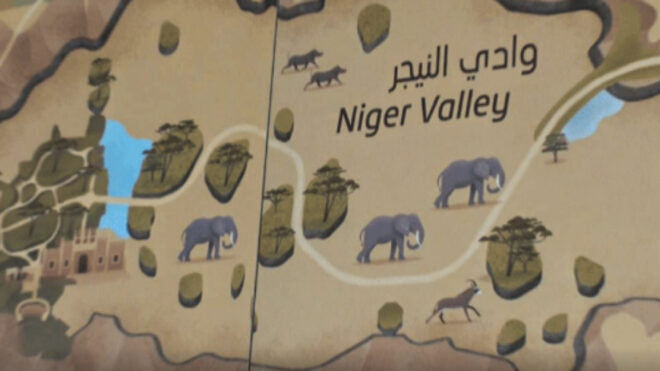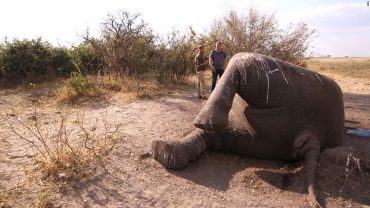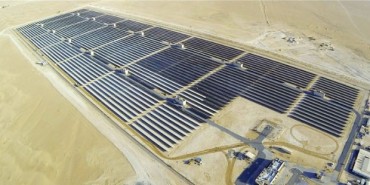Against conventions, a UAE safari and zoo are acquiring wild animals with no regards to international laws and agreements. A big surprise in a nation where the wealthy drive gold Mercedes, and who believe everyone with money should own their own private zoo and walk cheetahs on a leash?
In March 2022, a group of wild Namibian elephants landed in the United Arab Emirates. An investigation by The New Arab reveals that the sale served to simulate an African safari experience in Emirati zoos with no benefit for the animals and Namibian locals, and violates international protocols.
Initially captured from their natural habitat in Kamanjab, north-western Namibia in early September 2021, these African elephants — an endangered species — spent six months in quarantine captivity. They were then heavily sedated before being loaded into shipping containers, onto a plane, and transferred to their final destinations: the Sharjah Safari Park and Abu Dhabi’s Al-Ain Zoo.
Sharjah Safari Park opened earlier this year and like many bombastic projects in the Arab world, this one is the largest safari park outside of Africa.
Located at Al Bridi Nature Reserve, the safari park was created by Sheikh Dr. Sultan bin Muhammad Al Qasimi, Ruler of Sharjah. It has over 1,000 animals and birds to see.
See us on Al Jazeera TV talking about hypocritical ideas in the UAE. Some of the most controversial and counterproductive measures we’ve covered so far include the not so green Masdar project or celebrities releasing balloons to highlight the importance of green living; and now comes the UAE’s largest safari park. One with illegally-imported animals.
For Emirati rulers (except for the Green Sheik), the tourism-driven African theme of their wildlife parks apparently mattered more than the success of breeding programs.
It was made clear to Al-Ain Zoo Director Mark Craig that there were no imports from Africa with a European Association of Zoos and Aquaria (EAZA)-accredited breeding programme because past ones had not been successful. Arne Lawrenz, the EAZA Ex-situ Programme (EEP) coordinator for elephants, described the “philosophy” of the Emirati zoos as “I got the money, I want to have it. I don’t care if that works.”
That’s why you can see limping cheetahs in traffic in Abu Dhabi or members of the royal family in Saudi Arabia walking around with lions.
A voice, I heard, said I was born to love | Prince Amir Al Saud | LinkedIn http://t.co/ZX2sbM7oJm pic.twitter.com/61Fl1eABQW
— Prince Amir Al saud (@amirofriyadh) October 1, 2015
Wildlife is sold to the highest bidder and so if you have enough, you can buy the most rare and endangered animals on the planet.
The outcome of the deal between Namibian poachers and the safari and zoo in the UAE was a lucrative deal finalised through middlemen rather than a non-commercial exchange between zoos, reports The New Arab.
Upon learning about the deal the EAZA decided to terminate the Al-Ain Zoo’s membership on September 15.
John Grobler, a Namibian journalist involved in the investigation is planning to draw on this exposé to call for sanctions against Namibia at the CITES CoP 19 meeting in November, which is considered the world’s most important annual summit on wildlife trade.
The zoo’s membership will end on December 31, 2022, following the decision of EAZA Council that EAZA can no longer reasonably be expected to allow the institution to remain as a member.
We hope that tourists will boycott visits to the safari and zoo and that the animals will be returned to humane parks and safaris.
“The decision comes after careful examination of evidence related to the import of wild-caught African elephants from Namibia, which the Council agreed constituted multiple breaches of EAZA Codes and Standards,” EAZA said in a press statement.
It continued: “The African elephant EEP1 clearly stated that no approval would be given for such an import. The Elephant TAG2 repeatedly and clearly informed Al Ain Zoo that no import of wild caught elephants was either necessary or desirable. In response to urgent inquiries from both these bodies, communications from the zoo were insufficiently complete and transparent.
Wildlife trafficking is the fourth most lucrative illicit trade in the world, worth an estimated USD 15 billion annually.
“While all parties involved claim that the trade was legal and done with the well-being of the elephants in mind, international guidelines were clearly flouted, and involved parties were likely aware of this,” states EAZA.




